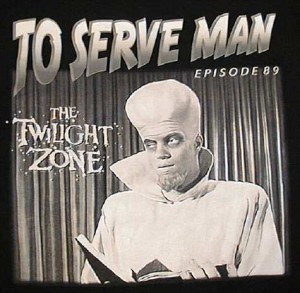How closely do you straddle the fine line between critical thinking and cynical derision? More to the point, can you differentiate between the two? Better yet, do you prefer to remain impartial to social, political, and philosophical matters, therefore choosing to travel the path of gullibility and vulnerability with the indistinguishable lambs being led to slaughter by oligarchs who rule their peasantry through fear and paranoia or snake-oil salesmen who bamboozle potential customers with too-good-to-be-true promises and tantalize with the suggestion of utopian bliss?
As we collectively begin to dip our toes into the turbulent waters of a new presidential election cycle, it seems an opportune time to ponder the individual mindsets which produce both hard-hearted pessimism and wide-eyed idealism and their widespread moral and ethical implications such as becoming anchored into a no-win scenario or left with a pick-your-poison option. What price peace and prosperity? The third-season Twilight Zone episode “To Serve Man” elected to pick at the exposed nerves of those very themes.
Michael Chambers used to be a cryptologist for the United States government but is presently imprisoned. Why and by whom we do not yet know. He communicates with a disembodied voice emanating from a wall-mounted speaker-box, first refusing a meal and then being lectured about his stamping out a cigarette on the floor and wasteful overuse of water. Chambers sarcastically asks what we now know to be his otherworldly host if it wouldn’t be too much to be made aware of the current Earth time without having to debate the intricacies of Euclidian geometry. He is told that it is twelve noon and he retreats into reverie involving metropolitan tableaus, people hurriedly going about their lives as best they can beneath the dark clouds of persistent danger posed by the red scare and domino theory, their daily routines disrupted by worrying thoughts of Russia, Berlin, and Indochina.
The Secretary General of the United Nations addresses the assembly as to the landing of a spacecraft outside of Newark, New Jersey (not far from Grovers Mill, site of Orson Welles 1938 War of the Worlds alien invasion) at approximately 11am EST which coincided with reports of similar sightings in several other countries. No imminent threat of hostile intent has been experienced or detected. A supplementary ship has touched down just blocks away from the UN building and a representative of the beings revealed as Kanamits is expected in the chamber shortly. Rod Serling introduces viewers to the alien creature with the bulbous cranium, unnervingly blank stare, and billy-goat beard as slightly over nine feet tall, 350 pounds, and of unknown origin. Their motives? As Serling cautions, “Therein hangs the tale.”
The Kanamit leader is embodied by Richard Kiel who is probably best known as the seven-foot-tall 007 villain Jaws in the James Bond film “Moonraker”, but (because the Kanamits converse telepathically rather than verbally) voiced by Joseph Ruskin, the Genie from season two’s “Man in the Bottle” who also played Galt in the original Star Trek series episode “The Gamesters of Triskelion”. Having materialized from somewhere beyond the stars, outfitted in flowing white robes, and often referring to a book held before him, the appearance of the Kanamit messenger is heavily suggestive of some sort of ecclesiastical figure if not a potential savior.
He declares honorable intentions such as establishing embassies and, therefore, diplomatic relations between the Kanamits and Earthlings which brings to mind the recent steps taken by the United States and Cuba to thaw their frigid, fifty year-long mutual contempt. Aware that ours is a culture that seems intent upon practicing brutality over charity, the Kanamit offers suggestions for alternative power sources, agrarian reform, and international measures toward reducing and eventually eliminating warfare. Should we refuse to respond positively, the General Assembly and television audience are assured, there will be no vengeful repercussions and, should we choose to implement their plans, the end of famine, warfare, and suffering is the sole reward the Kanamits expect and will accept. Purposely leaving his book behind, the Kanamit takes his leave and puts the future of the human race literally in their hands.
Michael Chambers is tasked with decoding the Kanamit language and confirming the validity of their claims but makes little progress and it is his assistant Patty who deciphers its ambiguous title. To Serve Man.
Deserts become gardens and armies are disbanded resulting in global harmony and bounty and leaving Chambers little else to do with his work day than play with a yo-yo at his desk. Thankful and curious Earthlings board a spaceship (the same one used in “Forbidden Planet”) bound for the Kanamits’ home planet, more and more so after receiving letters written from previous travelers boasting of their wonderful experiences. This mirrors the cheerful correspondence fabricated and circulated by Nazi guards during the Holocaust in a hollow attempt to alleviate the fears of European Jews whose destiny was sure to be the concentration camps their friends and loved ones had already disappeared to.
The blissfully ignorant passengers making their way up the steps of the vessel first step onto a scale, a smile of obvious delight illuminating the Kanamit’s face when someone of considerable girth approaches. Chambers is moments from embarking upon Flight 914 when Patty races to the rooftop loading area and screams for him to come back down because she has translated the remainder of the Kanamit text. “The rest of that book…To Serve Man…It’s a cookbook!” The Kanamit forces Chambers aboard and throws the hatch closed, turning slowly around with arms still upraised in a menacing gesture of both blasphemy and divinity. Courtesy of footage borrowed from Ray Harryhausen’s stop-motion masterpiece “Earth vs. The Flying Saucers”, the craft flies across the skyline and toward extraterrestrial territory not known to man.
The program concludes by returning to Chambers in his cramped quarters, flinging to the floor the tray of food pushed through a door slot. A Kanamit enters to pick it up and urge his future menu item to eat so as to bulk up. When the alien leaves, Chambers stares directly and alarmingly into the camera to warn the viewers that “Sooner or later, we’ll all of us be on the menu. All of us.”
Rod Serling signs off as Chambers greedily devours his meal by ruminating over “the cycle of going from dust to dessert, the metamorphosis from being the ruler of a planet to an ingredient in someone’s soup.”
[si-contact-form form=’3′]

 October 16th, 2015
October 16th, 2015  CEO
CEO 
 Posted in
Posted in  Tags:
Tags: 



